|  | |
 |
| Honoring Emory’s Veterans | “As we express our gratitude, we must never forget that the highest appreciation is not to utter words, but to live by them.”—John F. Kennedy
Veteran’s Day is observed every year on November 11, but here in Emory’s Woodruff Health Sciences Center (WHSC), we celebrate and support our nation’s veterans every day. That’s why I was deeply honored to participate in this year’s outstanding Veteran’s Day observance on November 10.
Our faculty and staff have a long history of serving our country both in wartime and in peace. The proud tradition dates back to World War I when the Emory Unit—a civilian medical regiment of physicians, surgeons, nurses, and others from the Emory community—reported for active duty to set up field hospitals in war torn areas. The tradition continued in World War II, when a new generation of Emory health professionals enlisted in the Emory Unit. And it continues today, as faculty and staff WHSC-wide have served and continue to serve in the military—including more than 650 employees of Emory Healthcare alone.
In addition to celebrating the courage and commitment of our active duty and veteran staff, the WHSC also supports veterans in the way we uniquely can—by providing them with the most cutting-edge care available. For example, our Nell Hodgson Woodruff School of Nursing (SON) is one of just 18 nursing schools nationwide selected for the VA Nursing Academic Partnership program, which offers training specifically focused on veteran-centered care. The Emory and Atlanta VA partnership has lasted more than six decades, helping to ensure patient-centered care for more than 130,000 enrolled veterans from 50 counties across northeast Georgia. And, of course, our Emory Veterans Program in partnership with the Wounded Warrior Project continues to make a life-changing difference for our nation’s servicemen and women by offering evidenced-based treatment for conditions such as post-traumatic stress disorder, traumatic brain injury, substance use disorder, anxiety, and depression related to military service.
I hope you were able to participate in some of this year’s Veteran’s Day activities. If not, please take a moment to express your respect and gratitude to those courageous colleagues who serve and have served in our nation’s military.
Ravi
Ravi I. Thadhani, MD, MPH
Executive Vice President for Health Affairs, Emory University
Executive Director, Woodruff Health Sciences Center
Vice Chair, Emory Healthcare Board of Directors
Please direct questions and comments to evphafeedback@emory.edu. | |
| |
| 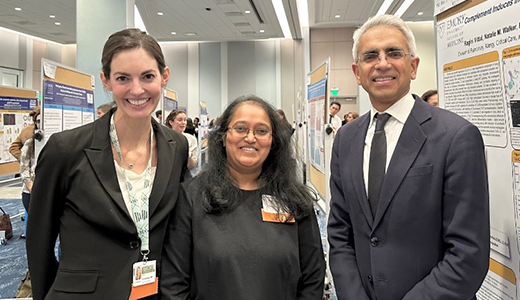 | Our People | The Emory Department of Medicine (DOM) held its 16th Annual Research Day earlier this month, welcoming more than 300 researchers, faculty, staff, and trainees to celebrate the groundbreaking research taking place across the department’s 10 divisions. The DOM received a record number of abstracts this year, showcasing progress across basic, translational, and clinical science through more than 150 poster presentations, 12 oral presentations, and several lectures, including the keynote I was deeply honored to present.
I particularly enjoyed the opportunity to peruse the poster presentations and meet some of the talented innovators who drive the extraordinary success of our research enterprise, including Assistant Professor of Medicine Emily Eichenberger (pictured above, left) and Senior Academic Research Scientist Ragini Vittal (pictured above, center). Though both are fairly new to Emory, Emily and Ragini are already making an impact in their respective divisions—infectious disease (Emily) and pulmonary (Ragini)—and both are proud to see their discoveries translated to enhance patient care and outcomes.
“I am a transplant infectious disease physician working toward becoming an independently funded physician-scientist,” says Emily. “Two of the most rewarding aspects of my job are 1) the patient care and 2) getting to generate clinical questions that I can then explore in a translational way.”
Ragini says, “I am a senior research scientist working with Vibha Lama at the Pulmonary Division. My research interest revolves around complement activation-driven pro-fibrotic mechanisms in the pathogenesis of lung fibrosis and chronic rejection in lung transplant patients. I have over 20 years of experience in this research area, and always felt rewarded by the prospect of research findings culminating in translational relevance.”
Emily and Ragini also agree that Emory’s research program is distinctive among peer research institutions.
“Emory has many resources available to junior faculty who are attempting to get their research program off the ground, including consultation with biostatisticians, grant writing support, and seminars offered through the Department of Medicine,” Emily says.
Ragini concurs: “Emory University has been one of the fastest growing research institutions in terms of funding in both the basic and clinical research areas. It is uniquely juxtaposed with Georgia Tech to drive innovative biomedical research that can offer translational relevance. Furthermore, considering the available number of undergraduate, graduate, and medical students from both institutions, it is a fertile ground for nurturing the next generation of the research community as well.”
Thank you, Emily and Ragini, and all who participated in the 16th Annual Research Day, for helping us improve lives and provide hope!
To nominate a colleague to be featured in an upcoming segment of Our People, please email me at evphafeedback@emory.ed and let me know what makes them special.
| |
| |
| DEI Highlight | Georgia Jackson, director of Workforce Development and Patient-Family Centered Care for Emory University Hospital, Emory Wesley Woods Hospital, and Emory University Orthopaedics and Spine Hospital, was selected to be in the first cohort of the AARP Center for Health Equity through Nursing (A-CHEN) Volunteer Ambassador Program.
The ambassadors will share best practices, opportunities, and learnings to implement change, and will promote scalable solutions, including a toolkit, to help end structural barriers to health and well-being. A-CHEN leverages the power of nursing, consumers, AARP, and national and state coalitions for collective impact and sustainable systems change.
The aim of the program is to:
- Focus on strengthening and diversifying the nursing workforce
- Understand the social determinants of health and nurses’ roles in care delivery
- Elevate and spread the concept of equity-minded nurses
- Improve health equity
- Implement recommendations from the Future of Nursing 2030 report.
Jackson also co-chairs both the Emory Healthcare DEI Steering Committee and DEI Leaders Network. | |
| |
| 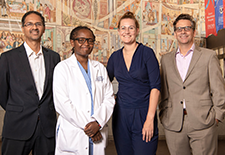 | | New institute harnesses power of AI to improve health equity | Launching this month under the umbrella of Emory’s AI.Humanity initiative, the Emory Empathetic AI for Health Institute will utilize artificial intelligence (AI) and computing power to discern patterns in vast amounts of data and make predictions that improve patient health outcomes in diseases such as lung, prostate, and breast cancer, heart disease, diabetes, and more. AI.Health faculty pictured above, l-r: Anant Madabhushi, Judy Gichoya, Marly van Assen, and Gari Clifford. Read more.
| | |
| | |  | | New center to study health impact of climate change | Rollins School of Public (RSPH) is establishing a center to study the impacts of climate change on health and help develop action-oriented strategies to protect the health of individuals and communities. The Climate & Health Actionable Research Translation Center (CHART) will advance and translate research on climate risks to protect the health of under-resourced urban populations. The center’s research will focus on heat-related illness in Atlanta and examine factors that may lead to disparities in illness outcomes. Read more
| | |
|
| |
|  | | Emory receives full accreditation for excellence in animal care | AAALAC International has awarded Emory continued full accreditation until 2026 for the university’s excellent animal care programs. Such voluntary accreditation demonstrates a willingness to go above and beyond what laws require and assures the public that an institution is committed to the responsible treatment of animals in science. The AAALAC accreditation process occurs every three years and includes an evaluation of overall performance as well as individual aspects of the university’s animal care program, including compliance with applicable animal legislation and institutional policies.
| | |
| | |  | | Inaugural cohort of resident startups to Lab2Launch | The School of Medicine (SOM) announced the first resident-startups of Lab2Launch, a new incubator at Emory that enables early-stage biotech companies to develop or commercialize Emory IP. The companies that are moving to Lab2Launch are pushing the boundary of science and span a broad spectrum of biomedical innovation areas, including therapeutics, vaccine development and imaging. Learn more about the initial six companies here. Lab2Launch is also currently vetting new applicants for residency. Learn more about the program and the application process.
| | |
|
| |
| 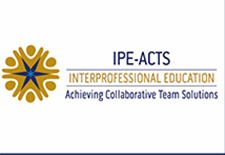 | | IPE-ACTS faculty champions and health challenges | The WHSC Office of Interprofessional Education and Collaborative Practice (IPECP) recently announced the 2024 faculty champions and health challenges for IPE-ACTS, Emory’s new interprofessional training program. IPE-ACTS faculty champions will lead first-year students in the schools of medicine, nursing, and public health as they address issues of health equity in during spring semester 2024. This year’s health challenges represent some of the most needed areas of engagement for improving health.
| | |
| | |  | | Virtual inpatient monitoring using AI | To help reduce fall risks and other safety concerns in hospitalized patients, Emory Healthcare is collaborating with Andor Health to bring virtual patient observer technology to its hospitals. The inpatient monitoring technology will provide an added layer of safety interventions for patients who need additional supervision and care. Emory Healthcare will begin piloting the virtual sitter technology in November at two of its hospitals, remotely monitoring at-risk patients on medical and surgical floors and in the emergency departments. Read more.
| | |
|
| |
| 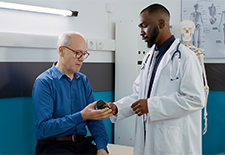 | | Collaboration to assist patients with medication adherence | Emory Healthcare is collaborating with health care technology pioneer DrFirst to help patients access and adhere to affordable, appropriate prescription medications for their health conditions and ailments. Research shows that medication adherence is a primary determinant of success in patient outcomes, while non-adherence can lead to a worsening of diseases and disorders, increased health care costs and even death. Read more.
| | |
| | | 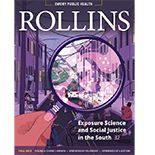 | | New issue of Rollins magazine now online | The latest issue of Rollins magazine explores how environmental exposures impact health and why the effects can vary widely among people and places, how the Rollins Epidemiology Fellowship bolstered the state public health workforce, and how some student experiences shape professional and personal lives. Read the issue here.
| | |
|
| |
|  | | Studying the connection between oral microbiome and Alzheimer’s disease | The SON is studying the contribution of the oral microbiome to Alzheimer’s disease risk. While Alzheimer’s disease affects millions of Americans, the cause of the disease is not fully understood. Several risk factors are associated with the disease, including demographic, genetic, lifestyle, medical, environmental, psychiatric, and infectious, says assistant professor Irene Yang, who is leading work on the R01 grant. Among the infectious factors associated with Alzheimer’s is periodontal disease, one of the most common conditions of the oral cavity. Read more.
| | |
| | | 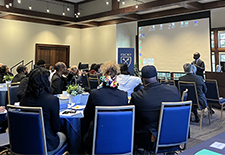 | | Violence Prevention Symposium brings together leaders across community | On October 30, Emory partnered with DeKalb County and Grady Health Systems to host a Violence Prevention Symposium at the Miller-Ward Alumni House. More than 100 policymakers, community leaders, health care providers, and other stakeholders engaged in a full day of presentations, workshops, and networking opportunities focused on protecting communities from the destructive impact of violence. Some of the presentation topics included "Preventing Firearm Injury Through Advocacy and Community Outreach," and "Developing Not-For-Profits Focused on Violence Prevention." Watch video highlights from the symposium.
| | |
|
| |
|  | | Virtual reality initiative to reduce youth athlete injury | The Emory Sports Performance And Research Center (SPARC) will establish the Georgia Initiative for Virtual Reality, Education and Sport program. The school-based program will leverage virtual reality technology and disseminate scientific discoveries from Emory SPARC to reduce injury risk in young athletes and improve their game performance. Read more.
| | |
| | |  | | Studying informal caregiving networks of adults with dementia | Faculty members from the SON and the University of Pittsburgh School of Nursing are teaming together to study the informal caregiving networks of older adults with dementia, with the goal of developing an interactive digital tool to capture the full scope of caregiving beyond the experience of primary caregivers. Read more.
| | |
|
| |
| | 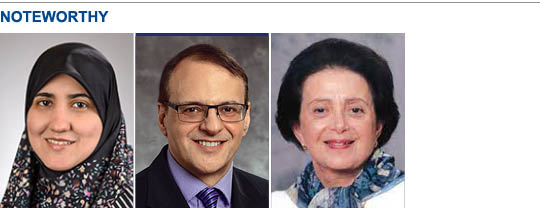 | | Fatemeh Ardeshir, thoracic oncologist, received the Translational Research Distinction Award for her oral presentation, "Cell Surface Target Discovery Pipeline in Metastatic Thymic Epithelial Tumors," at ECOG-ACRIN's 2023 Young Investigator Symposium.
Nabil Saba, medical oncologist, has been named associate editor of the Journal of the National Cancer Institute.
Nanette Wenger, professor of medicine in the division of cardiology, received the 2023 Alma Dea Morani, MD Renaissance Woman Award, the highest honor bestowed by the Women in Medicine Legacy Foundation. | |
| |
| | November 29 | Maternal Health Crisis Symposium. WHSC, Morehouse School of Medicine, and Mercer University School of Medicine, in collaboration with Research!America, will bring together care providers, researchers, and government and community partners to align resources and inspire change to improve maternal and child health throughout Georgia and the Southeast. Emory Conference Center Hotel. 9 am – 3 pm. Learn more and register here.
| | |
| | | | December 6 | Winship Scientific Symposium, featuring a keynote address from cancer immunologist Carl June, faculty presentations on emerging topics, and a poster session highlighting the latest research from Winship labs. HSRB I Auditorium & HSRB II Atrium. Keynote and scientific talks, 9:30 am - 3:30 pm; poster competition and reception, 5-7 pm. Learn more and register here.
| | |
|
| |
|

